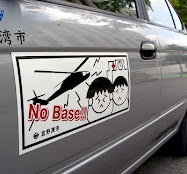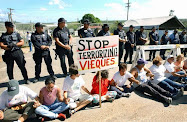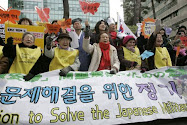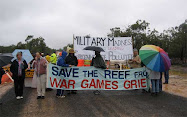Sunday, February 28, 2010
A Letter to President and First Lady Obama from WGS
Dear President & Michelle Obama,
As you prepare to make a stop over in Guam next month, en route to Australia and Indonesia, we ask that you take the opportunity to meet with Guam Senators and community members including women of Fuetsen Famalao’an.
As commander-in-chief of the military and Nobel Peace Prize laureate, and with your experience growing up in Hawaii and working as a community organizer you are uniquely qualified to listen to what they have to say about the proposed military build up on Guam, a small island with an already fragile ecosystem.
We are writing this letter on behalf of 100 women who gathered in Guåhan (Guam) September 14-19, 2009 for the International Women’s Network Against Militarism conference entitled, “Resistance, Resilience and Respect for Human Rights” (Chinemma, Nina’maolek, yan Inarespetu para Direchon Tao’tao). We came from Australia, Belau, Chuuk, Guåhan, Hawai’i, Japan, Okinawa, Northern Marianas Islands, Palau, the Philippines, Puerto Rico, South Korea and mainland United States.
We are mothers, grandmothers, young women, students, teachers, professors, social workers, religious workers, and community organizers in our respective communities.
We gathered in Guåhan for our 7th international women’s conference because of the imminent transfer of some 9,000 U.S. Marines, plus their 20,000 dependents and a further 20,000 foreign contract workers to Guåhan under the proposed Military Re-alignment plan. During our weeklong meeting, we heard testimony and panel presentations, visited important sacred sites, and observed numerous U.S. military installations around the island.
We heard many local concerns about the extensive military installations that already cover 1/3 of this small island (30 miles long and 8 miles wide, comparable to the size of Moloka’i), and some of the negative effects associated with them, such as contamination, crime and prostitution. Already the local population cannot eat the fish, drink the water, or grow their own food. Guåhan has twice the infant mortality rate as the U.S. mainland, and 1997% times the rate of nasal-pharyngeal cancer. We were touched by the Chamorro people’s deep love for their land, honoring their ancestors and providing for their future generations. They expressed deep concern about the impact of an additional 9,000 troops (potentially an additional 50,000 people) and the impact this would have on their already weak infrastructure, fragile ecosystem, and quality of life.
As you have lived in Hawai’i you are probably aware of how a major military presence can impact the local community, although some effects may be hidden from plain view.
In our discussions in Guåhan we noticed a pattern that brings about increased insecurity, particularly for women and for local communities that host U.S. bases or military personnel. What we observed in Guåhan is occurring in the other partner locations in our network: the Philippines, Korea, Okinawa, mainland Japan, Hawai’i, and Puerto Rico. The following are patterns we observed and heard repeatedly about the impact of U.S. military bases:
1. Violence Against Women
Local women live in fear because of the harassment, crime and violence committed by U.S. military personnel. For example, U.S. troops commit 95% of abductions and rape cases in Okinawa. In February 2008, a U.S. Marine sexually assaulted a 14-year-old Okinawan girl. A week later, a 22-year-old Filipina woman in Okinawa was raped by a U.S. soldier. And these are not isolated cases.
Under Status of Forces Agreements (SOFAs) and Visiting Forces Agreements with the United States, governments that host U.S. bases, such as Japan, Korea, and the Philippines, do not have adequate authority to protect local women, prosecute U.S. military personnel, or provide redress for crimes committed against local women.
Beyond this issue, a rise in prostitution and trafficking goes hand in hand with U.S. military bases and R&R sites, especially in the Asia Pacific region. Increasingly, poor women are being trafficked into the sex industry, and those working in this industry typically experience life-long trauma.
2. Environmental Harm
U.S. military bases generate noise and many negative impacts on air, soil, water and human health, threatening the sustainability of the environment and people’s lives, both now and for future generations.
Bases that have been closed such as in the Philippines (1992) and the bombing ranges in Vieques (2003) have still not been decontaminated and devolved for use by local communities.
Environmental contamination has been linked to high rates of cancer in communities alongside military fencelines. Guåhan and Vieques have no cancer treatment facilities, so people must spend their limited resources to travel elsewhere to receive the costly medical care they need.
3. Economic Impacts
Current U.S. military spending is more than $2 billion per day. This is a huge burden and expense, especially during these severe economic times -- in the U.S. and globally -- where these resources could be used to meet the many needs in health care, education, and economic development.
The U.S. delegates to the Guåhan conference came from California, where state budget cuts have taken a toll on many social services such as education and health care. This school year $580 million was cut from public higher education in California, with huge increases in costs of tuition and student fees. Academic departments have been shut down, classrooms are overcrowded, and teachers are being laid off. 10,000 eligible students were denied admission to public higher education this year. For youth who cannot afford to go to college, or who cannot find employment, joining the military is increasingly their only option.
Internationally, the U.S. military presence has distorted economic development in other countries because people’s access to land is cut off by bases, and local economies become geared towards servicing the U.S. military. For example, prior to WWII, Guåhan was self-sufficient in agricultural production. Today, 90% of its food is imported. Prostitution, bars and a service economy dependent on exploitation of cheap labor or trafficked persons typify the distorted economic development that accompanies U.S. military bases in the countries in our network.
4. Socio-cultural Impacts
U.S. military bases have a large impact on social-cultural development, democracy, and the voice and self-determination of local communities.
In Guåhan, Hawai’i, Okinawa, and other places, ancestral lands and burial sites are currently occupied and even being used for bombing and firing practice by the military.
Guåhan remains a non-self governing territory of the United States and the Chamorro people have no right of self-determination. Guåhan is on the United Nations list of 16 remaining colonies worldwide. An additional influx of outsiders, due to the military buildup, would further strain the culture, voice and sovereignty of indigenous Chamorro people on Guam.
As we observed these things and understood that they are part of a larger pattern, we were overcome with feelings of fear, sadness, pain, frustration, and anger. As women and as leaders in our communities, we are concerned about basic human needs, primarily the everyday security of our families and communities. Women in all our communities need safety, health care and prevention from harm, as well as the protection and care of our environment. We need to be able to participate in decisions affecting our communities and homelands. We need respect and consideration for our people’s land and our ancestors.
We believe that you may be able to understand these needs and request that you use the authority of your position to do the following:
1. Please consider and address the environmental, social, and community impacts the planned military build-up will have on Guåhan and do everything you can to stop it. When you visit Guåhan, please talk to members of Fuetsen Famalao’an, an organization of respected women (Guam Senators, University of Guam professors, and other professionals) who have come together out of concern about the military buildup. Dr. Vivian Dames, former Guam Senator Hope Cristobal, and Dr. Lisa Natividad are all at the University of Guam. As residents of a U.S. territory, none of them have any representation with voting power in the U.S. Congress.
2. Please consider the burden of Okinawan communities that disproportionately host U.S. bases in Japan. Okinawa is 0.6% of the Japanese land area, yet bears 75% of the burden of U.S. bases in Japan. It has been repeatedly stated that 8,000 Marines will be transferred to Guam to “reduce the burden” of Okinawa, but Okinawans are wondering why this is tied to building a new Marines base in Henoko? Please consider measures to reduce the numbers of troops overall, stop the building of yet another new base in Okinawa, and do not redirect Okinawa’s burden to Guåhan.
3. Re-examine and follow the existing Visiting Forces Agreement (VFA) between the U.S. and the Philippines. Serious violations have taken place that require detailed review, such as the presence of bases in Mindanao and jurisdiction over U.S. soldiers who commit crimes in the Philippines. Investigate the arguments of the numerous women’s and community groups who are pushing for the VFA to be repealed.
4. Support and promote legislation comparable to HR 1613 that has been introduced in Congress to amend the Radiation Exposure Compensation Act to include the Territory of Guam in the list of affected “downwind” areas with respect to the atmospheric nuclear testing that took place in Micronesia.
5. Support the Republic of the Marshall Islands Changed Circumstances Petition submitted to Congress for adequate compensation for personal injuries, property damage, medical care programs, and radiological monitoring related to the nuclear testing program conducted in the Marshall Islands.
6. Reduce future U.S. military aid to the Philippines government and enforce existing human rights conditions on current U.S. military aid to the Philippines. The clearly orchestrated massacre of 57 people in Maguindanao and countless other disappearances and extra-judicial killings reveal that there is very little accountability for U.S. weapons, military training, and military funding going to the Philippines Armed Forces.
7. Champion the clean up of toxic waste left behind in the Philippines and Puerto Rico since U.S. bases closed so that devolution to local communities can take place. The U.S. is building new bases when old bases still have not been cleaned up.
As recipient of the 2009 Nobel Peace Prize, we ask you to consider these requests as part of the work of creating peace and genuine security in this world. Any decision to go to war, to send more troops for training or deployment has effects on thousands of other local communities, and long-term impact on the land and health of our global future.
Sincerely,
Delegates of the 2009 International Women’s Network Against Militarism meeting in Guåhan (Guam), active with the following organizations:
Guåhan: Famoksaiyan and Fuetsen Famalao’an
Hawai’i: DMZ-Hawai’i/Aloha ‘Aina
Korea: Du Rae Bang (My Sister’s Place), the National Campaign to Eradicate Crime by U.S. Troops in Korea, and SAFE Korea
Okinawa: Okinawa Women Act Against Military Violence
Philippines: Philippine Women's Network on Peace and Security
Puerto Rico: Ilé, Inc./Organizers for Consciousness-in-Action and Alianza de Mujeres Viequenses (Viequenses Women's Allinace)
United States: Women for Genuine Security
Sunday, January 31, 2010
Monday, October 19, 2009
Conference Statement
The US military’s ‘global defense posture” means more military intervention by seeking more access to more territories through “visiting” agreements, basing agreements, expansion of bases and waging both conventional and unconventional wars, thus undermining the sovereignty of peoples, denying them of their right to self-determination and of their patrimony.
Amidst global financial and economic crises that has shaken the whole world and the global superpowers led by the US and aided by its allies in the Asia-Pacific region, including Australia and Japan, military build ups in the region continue. The wars in Iraq and Afghanistan, which have claimed thousands of lives especially from the civilian populations, are continuing. Apart from creating a culture of violence that especially affect women, youth and the elderly, environmental impacts have been noted by the participants, contributing significantly to the destruction of indigenous societies and global climate change. War exercises and trainings continue, in the name of the “anti-terrorism” campaigns in many parts of the world, particularly with former colonies in the Asia-Pacific region. We are aware that the legitimate actions against terrorist acts against the civilian populations are necessary, but must not be used as a pretext to justify military interventions that in the end terrorize civilian populations and create a culture of violence.
The US government in its realignment plan is expanding military power in Asia-Pacific, including the relocation plan of 8,000 Marines and their 9,000 dependents from Okinawa to Guahan that would go with building a new military facility in Okinawa. The meeting denounced this military expansion package plan in either place, and is firm in standing in solidarity with the Guahan people. The meeting forwards the following demands:
We ask women of “host” countries to push their governments to send foreign troops back to the US.
We urge the American people especially women to urge the US government for policies that respect the sovereignty of other countries and denounce the continuing wars of aggression and for demilitarization; instead the US government and its superpower allies to rechanneling a big portion of their military budgets towards health programs for its peoples especially women and children, for livelihood programs and secured jobs, and for the general welfare of their citizens.
Stop the expansion of bases in Guahan and other parts of the world!
End all military agreements that support US military hegemony!
Demand US responsibility to clean up the toxic wastes they left behind in the Philippines and Puerto Rico.
Pull out US troops from the Philippines and other countries!
Saturday, September 26, 2009
Women's Group Tackles Human Trafficking Issues
By Amritha Alladi
Pacific Daily News
September 15, 2009
 Delegates from all over the Pacific discussed the realities of human trafficking yesterday at the 7th Meeting of the International Network of Women Against Militarism, a conference bringing together women from several island-nations -- all of whom have felt the impact of U.S. military bases in their homelands.
Delegates from all over the Pacific discussed the realities of human trafficking yesterday at the 7th Meeting of the International Network of Women Against Militarism, a conference bringing together women from several island-nations -- all of whom have felt the impact of U.S. military bases in their homelands.Figures released by the Department of Justice show that 14,500 to 17,000 identified human trafficking cases are transported internationally to the United States, and the global figures are estimated to be about 600,000 to 800,000, according to Annie Fukushima, trafficking programs coordinator for Standing Against Global Exploitation.
During yesterday's pre-conference session, Fukushima said those numbers reflect only the known cases, and the real figures are most likely much higher.
Alexis Silverio, executive director for the Guahan Project, added that people who fall into human trafficking are usually promised education or a better life at the new destination, but once they've entered the strange environment, their only option is to stick with the only life they know-- a life of abuse.
He said the number of people being trafficked to or from Guam is unknown because several cases are pending investigation, and those cases haven't entered the court system yet. Guam's cases surface primarily in the massage parlors, he said, and in the back rooms of restaurants and mom-and-pop shops, so it's harder to detect.
'Wake-up call'
One conference attendee, Sister Lou Pangelinan, said a presentation by Philippine representative Aida F. Santos-Maranan made her realize there already is a problem on Guam and that it could potentially worsen with the impending military buildup.
Santos-Maranan said an estimated 40,000 male laborers would be trafficked to Guam from the Philippines and Palau due to the military buildup, and there was "no doubt" the women would follow.
"We need to give a wake-up call to our island that this is happening right in our backyard," Pangelinan said. "We can't help the whole world, but we need to face the reality that it is here."
The conference continues through Saturday, with topics covering military violence against women and girls, the plight of mixed-race Amerasian children abandoned by U.S. military fathers, environmental contamination, cultural degradation and the distortion of local economies.
Tuesday, September 22, 2009
Letter of Solidarity from Okinawa
Dear Members of the International Women's Network Against Militarism:
Secretariat
Citizens' Network for Biological Diversity in Okinawa
Thursday, September 17, 2009
Women Activists Explore a Post-Military Economy
Friday, 18 September 2009
Marianas Variety Guam Reporter
PEOPLE will have to work together if they want to sustain an economy after the military. This was emphasized during the fourth day of the 7th Meeting of the International Network of Women Against Militarism at the University of Guam in Mangilao.
The morning a panel focused on the topic “Beyond the Military Economy: Exploring Alternatives for Sustainability.”
Participating were Alma Bulawan of the Buklod Center Philippines, Dr. Hannah Middleton of the Australian Anti-Base Campaign, Dr. Miyume Tanji of Curtin University of Technology in Australia, and Isabella Sumang of Palau.
Each panelist gave a perspective of the impact the military has had on their respective regions.
Bulawan had indicated that when there were bases in the Philippines, businesses were set up to cater to the military as well as prostitution. It appears now that with those bases closed, businesses and the prostitution still remain.
She referred to the Subic Bay and Clark Freeport Zones, which formerly hosted the U.S. Naval Base and the Air Force Base and have each seen the creation and development of businesses.
Despite the conversion of the old bases, Bulawan said the Philippines continues to face economic challenges.
As for Australia, Middleton explained how millions of Australian dollars are spent on military defense and other armed forces programs. A recent poll showed that 70 percent of Australians do not want any more money spent on the military.
She added that the Australians believe the money should go on helping the environment, improving hospitals and even to create jobs.
“We expect one million Australians will be unemployed in 2010, money should be spent to help them find jobs,” she said.
During the open forum, several concerns were brought up including a question on whether they felt that the threat of an invasion and war is real here in Micronesia.
Sumang responded that it could be the case especially when there is a military presence. “You have that threat hanging over your head,” she said.
Middleton offered another perspective saying that the threat is an excuse to keep military bases in the region.
“It’s not real,” she pointed out.
The women’s conference concludes today at the Carmel on the Hill Retreat Center in Malojloj or the former Carmelite Convent.
Participants are expected to discuss Human Trafficking and Prostitution and gather together in group meetings to develop short term and long term goals.











